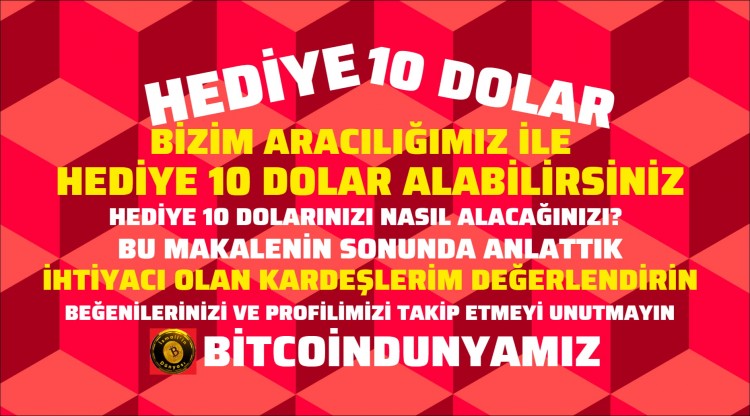时间:2024-01-31|浏览:344
撰文:Vitalik Buterin
编译:深潮TechFlow
导读:
三十而立。
今天是 Vitalik 的 30 岁生日,他也在这个重要的节点上,发表了人生一篇名为《我童年的终结》的长文。
纵观全文,Vitalik对以太坊的技术、加密世界的现状、俄乌战争、生存与死亡、成长和经验等消防主题表达了自己的感悟,同时他也直言:
加密世界里的核心人物,Vitalik过去的时间里走遍世界各地作为,以数字游民的方式践行着自己的技术理念,同时也面对世界各地的不同文化时,出现了更多的感悟与责任心。
这篇长文可以说是 Vitalik 站在 30 岁节点时,对个人经验和整个加密世界的综合性回顾与展望,内容一次丰富且情感真实。
深潮TechFlow对全文进行了编译,分享给各位读者。
在过去的两年里,我印象最深刻的一次是在黑客马拉松上演讲,参观黑客之家,在黑山做Zuzalu,看到比我年轻整整十岁的人在各个项目中担任领导角色,作为组织者或开发人员:加密审计,以太坊第2层扩展,合成生物学等等。Zuzalu核心组织团队的模因(MEME)是21岁的Nicole Sun之一,一年前,她邀请我参观韩国的一家黑客之家:大约有30人的聚会,我记得这是我第一次成为房间里最长的人。
当我和现在的黑客之家居民一样大的时候,我记得很多人都称赞我是像扎克伯格这样改变世界的、强大的、年轻的神童之一。
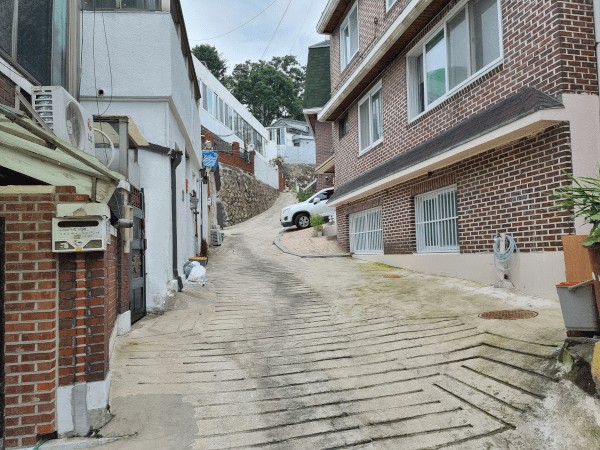
022年8月,通往首尔黑客之家的路径。应该是因为我无法辨别我进入哪所房子,我正在与组织者沟通以获取这些信息。当然,这所房子根本就不是这条路,但在它右边大约二十米处有一个更明显的眼睛的地方
1
延长寿命的支持者(意思是,进行医学研究以确保人类可以真正活几千年或几百万年),人们经常问我:生命的意义不是与它是有限的这一事实密切相关吗? :你只有一部分,所以你必须享受它?
从历史上看,我的直觉是驳斥这个想法的:虽然从心理学的角度来看,如果事物是有限的或稀缺的,我们往往会更重视它们,但认为长期存在的恩怨可能如此严重,以致比字面不再存在更糟糕,这简直是荒谬的。另外,我有时会想,即使永生被证明是那么糟糕,我们总是可以通过简单地选择来进行更多的战争来同时我们的“兴奋” ”并降低我们的寿命。今天,我们中间的非反社会者拒绝这种选择,这一事实强烈地向我表明,一旦它成为一种实际的选择,我们基因就会拒绝它,因为它在生物死亡中和痛苦方面也是如此。
然而,随着年龄的增长,我意识到我根本不需要讨论这些。
无论我们的生命作为一个整体是有限的还是无限的,我们生命中的一切美好事物都是有限的。你以为是永恒的友谊,却慢慢地消失在时间的迷雾中。你的性格可以在10年彻底改变。城市可以改变,无论好坏。你可以完全搬到一个新的城市,并重新开始从头开始熟悉物理环境的过程。政治意向是有限的:你可能会围绕你对最高边缘阶级和公共医疗保健的观点建立了完整的身份,十年后,一旦人们似乎完全不再关心这些话题,转而把所有时间花在谈论“觉醒”、“青铜时代心态”和“e/acc”上。 ”上,你就会感到完全迷失。
(i)我正在寻找的东西是不可能的,(ii)在实践中确定存在缺陷的系统成功与否的最重要指标(往往是参与者子群体之间的协调程度,但也经常包括我们将其简化为“文化”的其他因素)是我什至未曾建模的指标。
以前,数学是我身份的主要部分:我在高中时大量参与数学竞赛,在我进入加密货币领域后不久,我开始在以太坊、比特币和其他地方做大量的编码,我对每一个新的密码学协议都感到兴奋,在我看来,经济学也是更广泛的世界观的一部分:它是理解和弄清楚如何改善社会世界的数学工具。所有部件都已经组合在一起。
现在,这些碎片组合在一起的次数减少了。我仍然使用来分析社会机制,尽管目标更多时候是提出粗略的第一次猜测,即什么可能有效并减少最坏情况的行为(在现实世界中)中,这通常是由机器人而不是人类完成的),而不是解释一般情况下的行为。现在,我更多的写作和思考,支持即使我十年前支持的那种理想,也经常使用非常不同的论点。
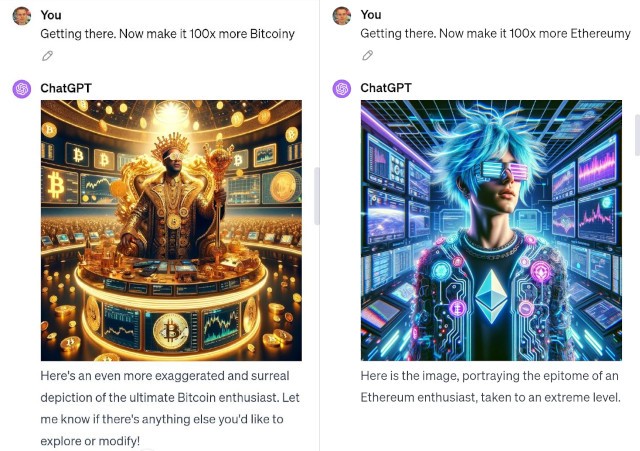
现代人工智能让我着迷的一件事是,它让我们在数学和哲学上以不同的方式参与指导人类互动隐藏的变量:人工智能可以使“声音”易读
所有这些死亡、出生和重生,无论是思想还是人的集合,都是有限的方式。这些死亡和出生将继续发生在我们生活的一个世纪、一千年或与主序星生命相同的世界中。如果你觉得生命没有足够的有限性、死亡和重生,你就有必要引发战争来增加更多:你也可以做出和我一样的选择,成为一个数字游民。
2
“马里乌波尔的毕业生正在倒下”。(译者注:直译为火炮在马里乌波尔城市降下,应暗指俄乌战争)
我仍然记得昨天2022年2月23日晚上7点20分,我在丹佛的酒店房间里焦急地看着电脑屏幕。在过去的两个小时里,我一直在同步滚动Twitter上获取更新,并反复联系我的父亲,他和我都有同样的想法和恐惧,直到他给我最终做出决定性的回复。我发布了一条推文,要求明确表达了我对这个问题的表述,我一直专注。那天晚上我熬夜了。
第二天早上,我起床时看到乌克兰政府的推特账户拼命要求以加密货币激活。俄罗斯政府本身,利用每个人的困惑和绝望来偷一些钱。我的“安全心态”本能引发了上风,我立即开始发推文警告人们要小心,同时通过我的网络寻找可以或确认否认ETH地址是否是真实的人。一个小时后,我确信它实际上是真实的,我公开转达了我的结论。大约一个小时后,一位家人给我发了一条信息,指出我已经做了什么,为了为了我的安全,我最好不要再回俄罗斯了。
Eight months later, I see the crypto world going through a very different kind of turmoil: the public demise of Sam Bankman-Fried and FTX. At the time, someone posted a long list of "crypto protagonists" on Twitter, showing which ones had fallen and which ones were still intact. This list has a high casualty rate:
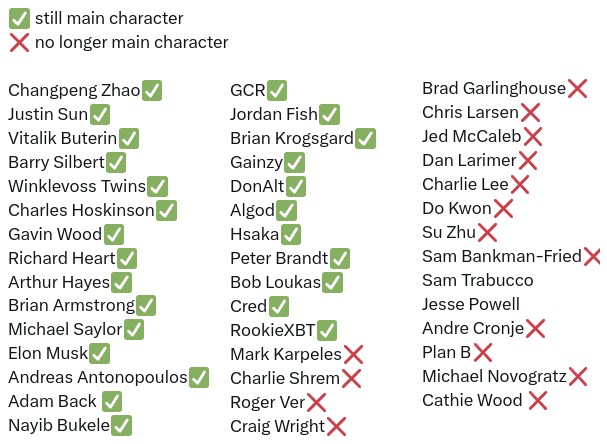
The SBF situation is not unique: it is a mix of MtGox and several previous major upheavals that have engulfed the crypto world. But this was the moment when I realized, all at once, that most of the people I had viewed as guiding lights in the crypto world, that I had felt comfortable following since 2014, were no longer there.
People who look at me from a distance often think of me as a high-motivation person, presumably because that's what you'd expect from a "protagonist" or "project founder" who is a "college dropout." However, in reality, I am anything but. The virtue I valued as a child was not the virtue of being creative when starting a unique new project, or showing courage when it was needed, but rather the virtue of showing up on time, doing homework, and getting a 99% average. The virtues of a good student.
My decision to drop out of school was not a courageous step of faith. It started in early 2013 when I decided to take a paid internship over the summer to work for Ripple. When US visa complications prevented this, I instead spent the summer working with my Bitcoin Magazine boss and friend Mihai Alisie in Spain. At the end of August I decided I needed to spend more time exploring the crypto world, so I extended my vacation to 12 months. It wasn’t until January 2014, when I saw hundreds of people cheering for my talk introducing Ethereum at BTC Miami, that I finally realized I had chosen to leave college for good. Most of my decisions in Ethereum involve responding to pressure and demands from others. When I met Vladimir Putin in 2017, I didn’t try to arrange a meeting; instead, someone else suggested it and I pretty much said “sure.”
Now, five years later, I finally realize that: (i) I had been complicit in legitimizing a genocidal dictator, and (ii) I no longer have the luxury of sitting back and letting those mysterious people in the crypto space The "other" has the luxury of taking charge.
Both incidents, although they differed in the type and scale of their tragedies, burned similar lessons into my mind: I actually have responsibilities in this world, and I need to be intentional about how I Mode of operation. Doing nothing, or living on autopilot and allowing yourself to simply become part of someone else's plan, is not an automatically safe or even blameless course of action.
I am one of the mysterious others who play this role. If I don't and the crypto space either stagnates or is dominated by opportunistic money grabbers, then I have only myself to blame. So I decided to be cautious about accepting other people's plans and be more vocal about the plans I made myself: have less ill-conceived meetings with random powerful people who were only interested in me as a source of legitimacy, and do more Things like Zuzalu.

Zuzalu flag in Montenegro, spring 2023
3
Let’s move on to happier things—or at least challenges that feel more like a math puzzle than falling while running and needing to walk 2 kilometers to seek medical attention with a bleeding knee. The author isn't going to share any more details, noting that the internet is already very good at turning photos of a rolled-up USB cable in his pocket into memes suggesting something entirely different, and he certainly doesn't want to give those people any more "ammunition." .
I've talked before about the changing role of economics, the need to think about motivation (and coordination: we're social animals, so the two are actually closely linked) in a different way, and the idea that the world is turning into a "jungle" : Big government, big business, the big mob, and almost any "big XX" will continue to grow, and the interactions between them will become more frequent and complex. I haven’t talked much about how many of these changes will impact the crypto space itself.
The crypto space was born in late 2008, in the aftermath of the global financial crisis. The genesis block of the Bitcoin blockchain quotes this famous article from the British Times:
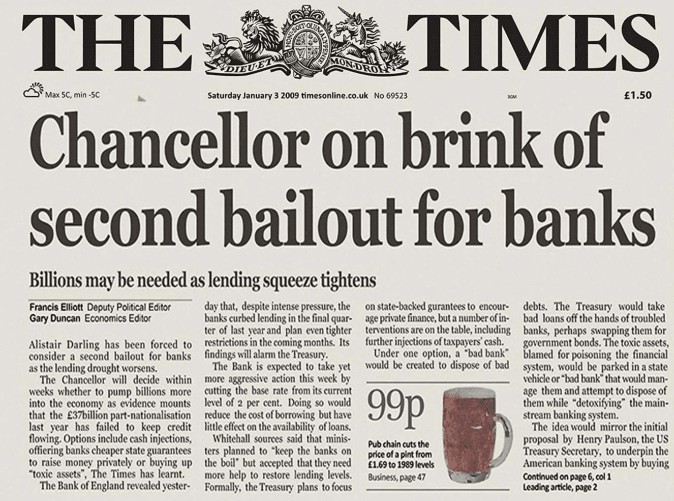
Bitcoin’s early memes were heavily influenced by these themes. Bitcoin is about abolishing banks, which is a good thing because banks are unsustainable monoliths that constantly create financial crises. Bitcoin exists to abolish fiat currency, because the banking system cannot exist without the underlying central banks and the fiat currency they issue—plus, fiat currency makes it possible to print money to fund wars. But in the fifteen years since then, the broader public discourse as a whole appears to have largely moved beyond concerns about money and banks. What is considered important now? Well, we can ask about a copy of Mixtral 8x7b running on my new GPU laptop:
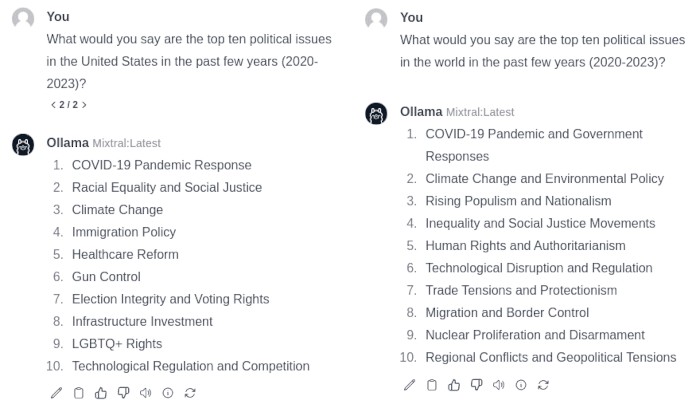
Once again, AI can make resonances legible
There is no mention of currency and bank or government control of currency. Trade and inequality are listed as issues of global concern, but as far as I can tell, the problems and solutions being discussed occur more in the physical world than the digital world. Is the original “story” of cryptocurrency increasingly behind the times?
There are two sensible responses to this conundrum, and I believe our ecosystem will benefit from both:
A reminder that money and finance still matter, and serving the world’s underserved in this niche
Looking beyond finance to use our technology to build a more comprehensive vision of an alternative tech stack that is freer, more open and democratic, and how to build a better society more broadly, or at least help those who have been excluded Tools for people outside mainstream digital infrastructure.
It's important to note that I think the crypto space is uniquely positioned to provide value there. Cryptocurrency is one of the few tech industries that is truly highly decentralized, with developers spread across the globe:
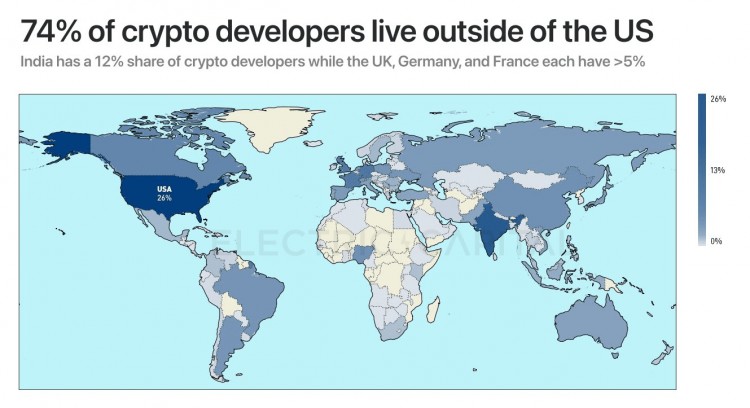
Source: Electric Capital’s 2023 Cryptocurrency Developer Report
Having visited many new global cryptocurrency hubs over the past year, I can confirm that this is indeed the case. Increasingly, large crypto projects are headquartered all over the world, or nowhere else. Additionally, non-Western developers often have a unique advantage in understanding the specific needs of crypto users in low-income countries and being able to create products that meet those needs. When I talk to a lot of people from San Francisco, I get the distinct impression that they think AI is the only thing that matters, that San Francisco is the capital of AI, so San Francisco is the only place that matters. "So, Vitalik, why haven't you settled down in the Gulf with your O1 visa yet"? Cryptocurrencies don’t need to play this game: it’s a big world and it only takes a visit to Argentina, Turkey or Zambia to remind yourself that many people still have important issues related to access to money and funding, and that there are still opportunities to balance Complex work on user experience and decentralization to truly solve these problems in a sustainable way.
Another vision is the one I outlined in my recent post, “Making Ethereum Cypherpunk Again.” Rather than just focusing on money, or becoming the “Internet of Value,” I think the Ethereum community should broaden its horizons. We should create a complete decentralized technology stack - one that is independent of the traditional Silicon Valley technology stack to the same extent as e.g. China's tech stack is - and competes with centralized tech companies at every level.
Let’s repost this technology stack comparison table again:
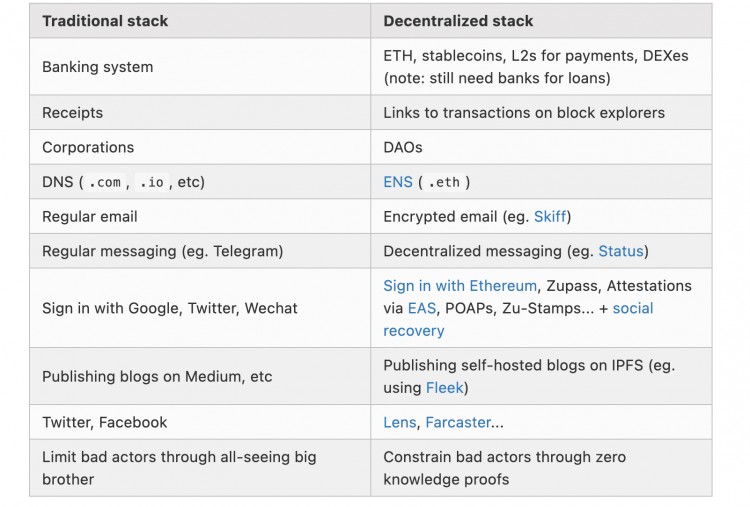
After I published that article, some readers reminded me that an important missing piece of the system is the technology of democratic governance: the tools through which people collectively make decisions. This is what centralized technology is really trying to provide, since each company is assumed to be run by a CEO, with oversight provided by...well...a board of directors. Ethereum has benefited from very primitive democratic governance techniques in the past, when a series of controversial decisions, such as the DAO fork and several rounds of issuance reductions, were made in 2016-2017, according to a team from Shanghai. Created a platform called Carbonvote where ETH holders can vote on decisions.
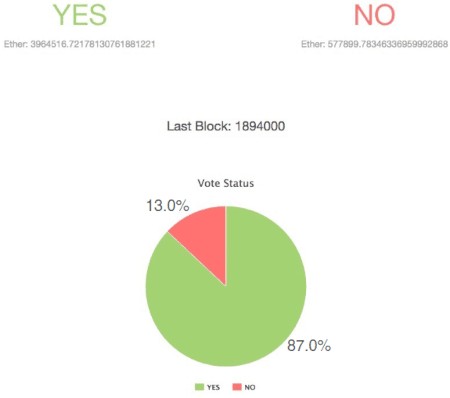
ETH votes on DAO fork
The vote is advisory in nature: there is no hard and fast agreement that the outcome will determine what happens. However, they help core developers have the confidence to actually implement a range of EIPs, knowing that the wider community will support them. Today, we have access to much richer proof of community membership than token holdings: POAP, Gitcoin Passport points, Zu stamps, and more.
Taken together, we can begin to see a second vision of how the crypto space can evolve to better meet the concerns and needs of the 21st century: creating a more comprehensive, trustworthy, democratic, and decentralized technology stack. Zero-knowledge proofs are key to expanding what this stack can offer: we can move beyond the false binary of “anonymous and therefore untrusted” versus “verified and KYC’d” and prove everything about who we are and what we have A more fine-grained statement of which permissions are available. This allows us to simultaneously address concerns about authenticity and manipulation – protecting against “Big Brother outside” – as well as concerns about privacy – protecting against “Big Brother within”. In this way, cryptocurrency becomes more than just a financial story and can be part of a broader story of creating better technology.
4
But how do we achieve this, beyond telling stories? Here we return to some of the issues I raised in my post three years ago: the changing nature of motivation. Often, those who focus too much on a theory of financial motivation – or at least a theory of motivation in which financial motivation can be understood and analyzed, while everything else is treated as a mystery we call “culture” Black Box – Be confused by this space because many actions seem contrary to financial motivations. “Users don’t care about decentralization”, but projects still often strive to be decentralized. “Consensus is built on game theory” However, successful social campaigns that drive people out of dominant mining or staking pools work in Bitcoin and Ethereum.
I recently realized that no one I've seen has attempted to create a basic, functional map of cryptospace that works "as expected" in an attempt to include more actors and motivations. So let me try this quickly now:
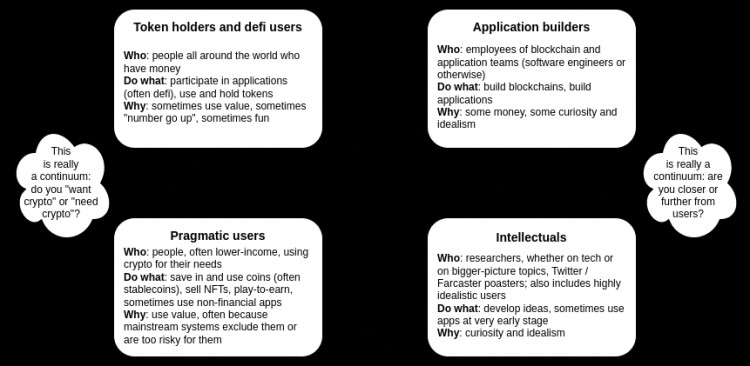
The map itself is an intentional mix of 50/50 idealism and "depicting reality." It aims to demonstrate the four main components of an ecosystem, which can support each other and have a symbiotic relationship. In practice, many crypto agencies are a mixture of these four.
Each of these four components provides something critical to the overall machine:
Token holders and defi users contribute heavily to the financing of the whole thing, which is key to bringing technologies like consensus algorithms and zero-knowledge proofs to production quality.
Intellectuals provide ideas to ensure that the space is actually doing something meaningful.
Builder bridges the gap and tries to build applications that serve users and bring ideas to life.
Pragmatic users are the people we ultimately serve.
Each of the four groups has complex motivations, and these motivations interact with the other groups in a variety of complex ways. There are also “dysfunctional” versions of each group: apps may be exploitative, DeFi users may inadvertently reinforce the network effects of exploitative apps, pragmatist users may deepen their reliance on centralized workflows, intellectuals may Getting too caught up in theory, focusing on trying to solve every problem by blaming people for being "inconsistent", without recognizing that financial incentives (and the disincentives of "user inconvenience") are also important and can and should be addressed.
Often, these groups have a tendency to laugh at each other, and sometimes I do play a part in that. Some blockchain projects are openly trying to move away from what they see as childish, utopian, and distracting idealism and focus directly on applications and usage. Some developers belittle their token holders and their dirty love for making money. There are also developers who belittle pragmatic users and their sordid willingness to use centralized solutions when it's more convenient for them.
But I think there is an opportunity to increase understanding between these four groups, with each party understanding that it is ultimately dependent on the other three groups, working to limit its own excesses, and recognizing that in many cases, their dreams are less than they imagined. So far away. I think this is a form of peace that is actually possible, both within the “crypto space” and between neighboring communities with whom it aligns strongly with its values.
5
The beauty of the global nature of cryptocurrency is that it provides me with a window into a variety of fascinating cultures and subcultures around the world and how they interact with the crypto world.
I still remember my first visit to China in 2014 and seeing all the signs of light and hope: exchanges scaling to hundreds of employees, faster than even the US, massive GPU and later ASIC mining pools , and projects with millions of users. Meanwhile, Silicon Valley and Europe have long been the main engines of idealism in the field, with two distinct flavors. Almost from the beginning, Ethereum’s development was de facto headquartered in Berlin, and it was within Europe’s open source culture that many of the early ideas for how to use Ethereum for non-financial applications emerged.
Diagram of Ethereum and two proposed non-blockchain sister protocols Whisper and Swarm, which Gavin Wood used in many of his early talks
Silicon Valley (and, of course, I mean the entire San Francisco Bay Area) was another hotbed of early cryptocurrency interest, mixed with ideologies as diverse as rationalism, effective altruism, and transhumanism. In the 2010s, these ideas were new, and they felt "crypto-adjacent": many people who were interested in them were also interested in crypto.
Elsewhere, letting ordinary businesses use cryptocurrencies for payments is a hot topic. You can find people accepting Bitcoin in a variety of places around the world, including Japanese waiters taking Bitcoin as tips:
Since then, these communities have gone through a lot of changes. In addition to other broader challenges, China has experienced multiple cryptocurrency crackdowns, resulting in Singapore becoming the new home for many developers. Silicon Valley is divided: Rationalists and artificial intelligence developers were essentially different factions of the same team until 2020, when Scott Alexander was doxxed by the New York Times. Dueling factions on the question of optimism versus pessimism about artificial intelligence’s default paths. Ethereum’s zone makeup has undergone significant changes, especially during the introduction of entirely new teams for proof-of-stake in 2018, although more by adding new teams than by dying off old ones. Death, birth and rebirth.
There are many other communities worth mentioning.
When I made my first of many visits to Taiwan in 2016 and 2017, what struck me most was the combination of self-organizing capabilities and willingness to learn from the people there. Whenever I write a document or blog post, I often find that within a day, a study club will form on its own and start excitedly annotating every paragraph of the post on Google Docs. Recently, members of Taiwan’s Ministry of Digital Affairs were equally excited about Glen Weyl’s ideas on digital democracy and “pluralism,” and quickly posted a complete mind map of the field on their Twitter account (This includes many Ethereum applications).
Paul Graham once wrote about how every city sends one message: In New York, "You should make more money." You should really read all these books in Boston. In Silicon Valley, "You should be stronger." When I visited Taipei, the message that came to mind was "You should rediscover your inner high school student."
Glen Weyl and Audrey Tang spoke at a study session at Nowhere Bookstore in Taipei, where I gave a talk on community notes four months ago
When I visited Argentina several times over the past few years, I was struck by the desire and willingness to build and apply the technology and ideas that Ethereum and the wider crypto world have to offer. If places like Silicon Valley are the frontier, full of abstract thoughts about a better future, then places like Argentina are the frontier, full of positive motivation to meet the challenges that need to be addressed today: in Argentina's case, ultra-high inflation and Limited connections to the global financial system. Cryptocurrency adoption there is off the charts: I get recognized on the street in Buenos Aires more often than I do in San Francisco. There are also a number of local builders, with a surprisingly healthy mix of pragmatism and idealism, working on people's challenges, whether it's crypto/fiat conversions or improving the state of Latin American Ethereum nodes.
I was in a coffee shop in Buenos Aires with a friend and we paid with ETH
还有很多其他值得一提的:位于迪拜的世界主义和国际化的加密社区,东亚和东南亚各地不断壮大的ZK社区,肯尼亚充满活力和务实的建设者,科罗拉多州以公共产品为导向的太阳能朋克社区,等等。
6
一个人在成长过程中会学到很多教训,而不同的人有不同的教训。对我来说,有一些是:
每个人都会学习这些很长的尾巴,原则上我可以走得更久。但是,只要从阅读别人的经验中实际可以学到多少东西也是有限的。随着世界开始以更快的速度变化,从其他人的叙述中获得的经验教训也以更快的速度过时了。因此,以高度、简单、缓慢的方式做事并获得个人经验也是无可替代的。
7
社会世界中的每一个美好事物——一个社区、一个通知、一个“场景”、一个国家,或者一个非常小的公司、一个家庭或一种关系——都是由人创造的。在极少数情况下,你可以写一个关于它自人类文明和十八部落诞生以来如何存在的合理故事,但在某些时候,必须有人真正过去写这个故事。这些东西是有限的——既是事物本身,作为世界的一部分,也是你体验到它的事物,是潜在的现实相和你自己思考和解释它的方式的融合。随着社区、场所、场景、公司和家庭的消失,必须创造新的社区来取代他们。
对我来说,2023年是看着许多大型宇宙事物在遥远的一年中逐渐消失。世界正在迅速变化,我被迫试图理解世界的框架正在发生变化,我在世界方面所扮演的同时正在发生变化。有死亡,一种首次的死亡类型,即使在人类生物衰老和死亡的枯萎从我们的文明中被清除之后,它在染色体上继续与我们同在,但也有出生和重生。保持持续活跃并尽我们所能创造新事物是我们每个人的任务。

![[数字金融达人]快乐的童年](/img/btc/47.jpeg)
![[卿云论]快乐的童年](/img/20240715/5376247-1.jpg)
![[伯特]庆祝26岁生日后退伍军人被8辆车碾压身亡:这是一场噩梦](/img/20240101/3102543-1.jpg)
![[伯特]庆祝26岁生日后退伍军人被8辆车碾压身亡:这是一场噩梦](/img/20240101/3102543-1.jpg)

![[丽莎]Jeannie Mai金色比基尼雪地口渴陷阱-庆祝45岁生日](/img/20240105/3137872-1.jpg)
![[丽莎]Jeannie Mai分享金色比基尼庆祝45岁生日](/img/20240105/3137872-1.jpg)
![[玛丽]马修·麦康纳女儿维达14岁生日照片](/img/20240105/3139197-1.jpg)
